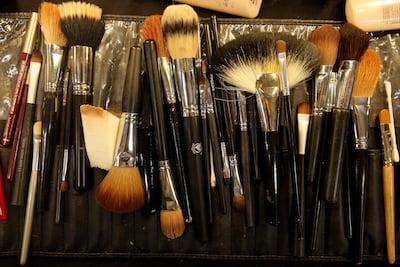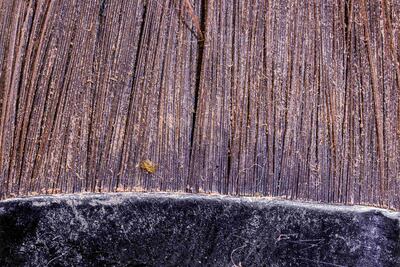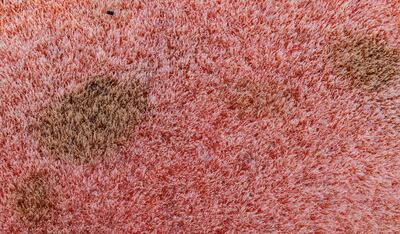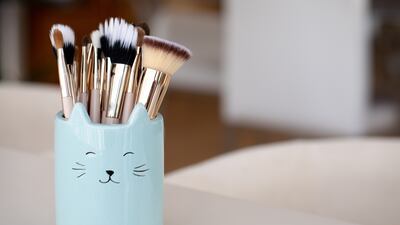When was the last time you cleaned your lipstick brush? Not just wiped it with some tissue, but gave it a deep, thorough wash?
If you are struggling to remember, it seems you are not alone. A recent study by beauty site Beauty Pie revealed one in six British people quizzed have never cleaned the sponges, brushes, mitts and spatulas used on their faces and bodies.
In an attempt to get us to change our grubby ways, Beauty Pie teamed up with photographer Matthew Doogue to document the grime that builds up on tools that have not been properly cleaned.
According to the survey, skincare tools such as a gua sha stone are among the dirtiest beauty products, with 73 per cent confessing to never cleaning it; and 68 per cent admitting to having never washed their fake tan mitt, instead just layering on more product and reusing.
Meanwhile, 53 per cent revealed their beauty blender remains uncleaned despite being used to apply liquid products, while 45 per cent never wash their foundation brush.
These figures reveal that, despite the lessons of the recent pandemic, many of us overlook the need for good hygiene with beauty products.

According to the American Academy of Dermatology, dirty brushes and tools harbour germs and bacteria that can cause infections including fungal infection, E coli or even staph infection, which can lead to far more serious complications. To mitigate these risks, it advises that brushes and tools be washed “every seven to 10 days” to keep bacteria at bay.
With every use, make-up products mixed with oil, dead skin cells and dirt from the skin quickly build up on the fibres of brushes and surfaces of sponges and blenders. While invisible to the eye, they will be wiped back on to the skin with the next use.

“I think everyone should wash their make-up brushes after every use,” says professional make-up artist Gulum Erzincan. "This way we protect our skin and eyes.”
Erzincan, who works in Turkey and Dubai, interacts with different models every day, so she has to maintain scrupulous hygiene standards to stop bacteria spreading from one face to another. “I clean my kit after every job, and prefer disposable brushes for lipstick and mascara," she says. “The best way is to wash all brushes and sponges with a bar of soap, making sure everything is thoroughly cleaned.”
This practice is echoed by Ania Poniatowska, a professional make-up artist in Dubai. "For natural brushes, I use an alcohol-free brush cleaner on a daily basis, and I shampoo and condition my brushes once a week. Synthetic brushes should be washed with soap and air-dried afterwards," she says.

To ensure brushes smell their best, Poniatowska also uses a fragranced soap. "I use lavender soap as there is nothing worse than a bad-smelling brush touching a model's face," she says.
One tip to get Beautyblenders and sponges clean is to pop them in a mug with some water mixed with a little washing-up liquid and microwave it for one minute. However, this is not good enough for Poniatowska, who instead prefers to ditch using tools completely when it comes to applying foundation, blush and eyeshadow.
“I prefer using my fingers for blending, as I can clean them as much as I like with sanitiser. I keep my nails short and don’t wear polish,” she says.
While most people are not sharing make-up with anyone else, that is not an excuse to be complacent, experts say. For convenience, it is tempting to dip fingers directly into pots of creams, gels and lotions when applying them but the advice is: don't. This is due to the possibility of introducing germs and bacteria that can rapidly multiply, which could potentially cause future skin infections and ruin the product.
Products and the ingredients in them can break down if not looked after properly, so it's best to follow the lead of professionals and use a spatula or cotton bud and put it on a cleanable surface like a beauty tray.

The key to hygiene is prevention, Erizincan explains, which is particularly important for those who suffer from recurring viruses. "If you have a cold sore, you can clean your lipstick with alcohol disinfectant. Or, even better, take a little bit of lipstick with a spatula and apply it with a brush, which will keep the lipstick clean,” she says.
Make-up pencils should be sharpened before every use to remove potential dirt, suggests Poniatowska, while pressed powders such as eyeshadow can be cleaned by simply skimming off the top layer and lightly spraying with sanitiser.
Looking after brushes, skin tools and products helps to get the best use out of them. Make-up and skincare products can range in price, but they are always an investment.
However, it's worth being mindful of expiry dates, because every beauty product has one. Lipsticks do not last for ever and cleaning them will not extend the shelf life. Even if it's now a discontinued, all-time favourite – if it is out of date, bin it. Nothing is worth risking a skin or eye infection over.

